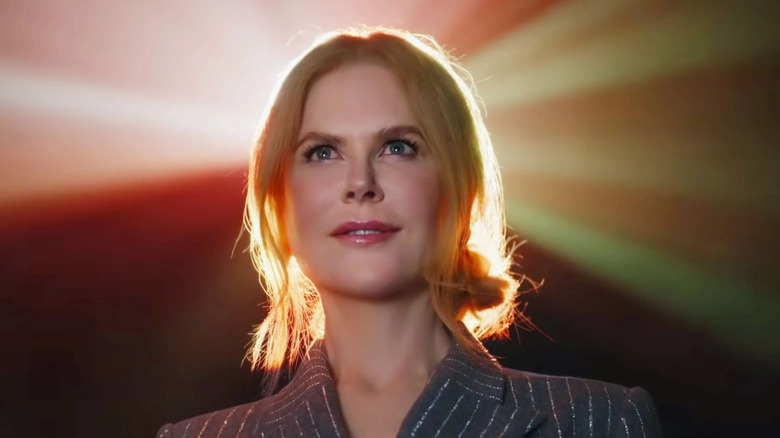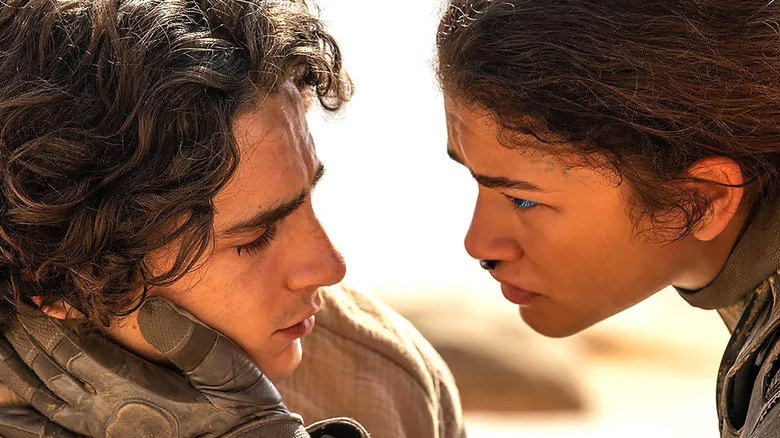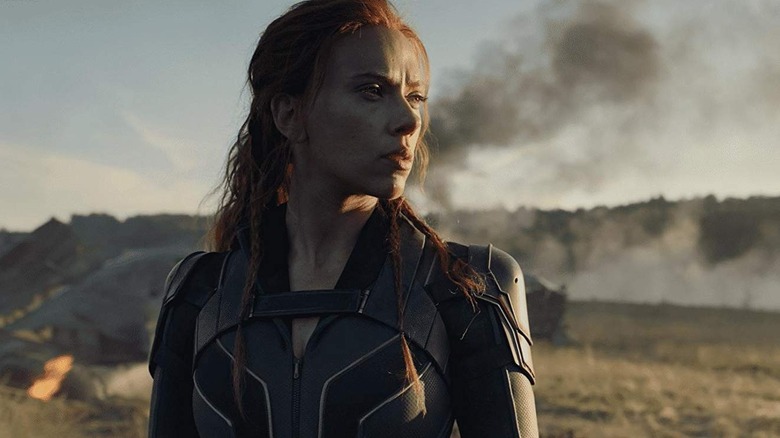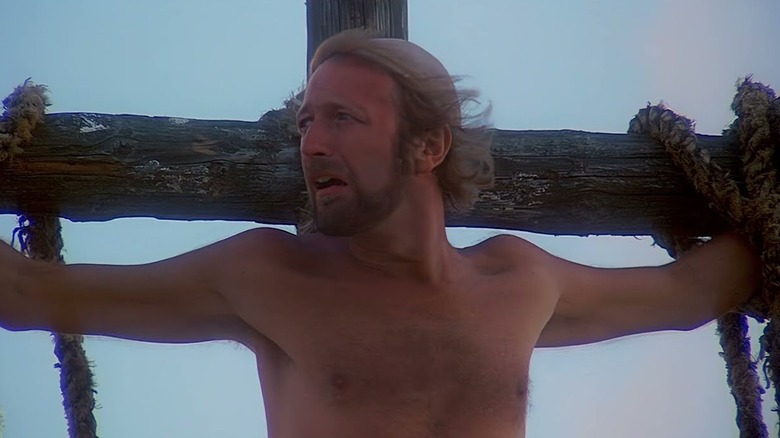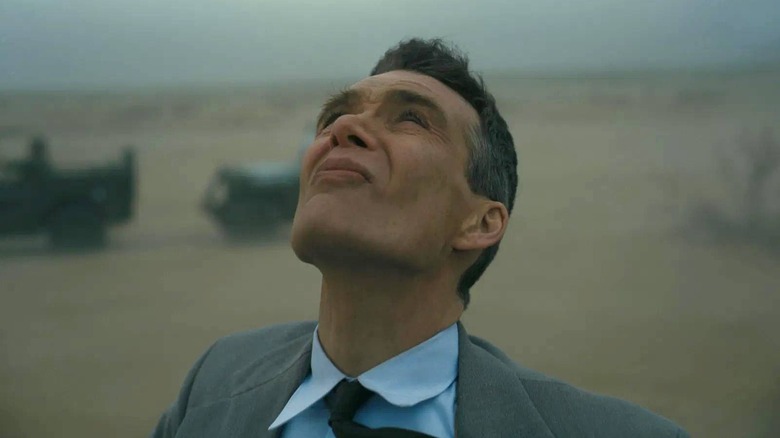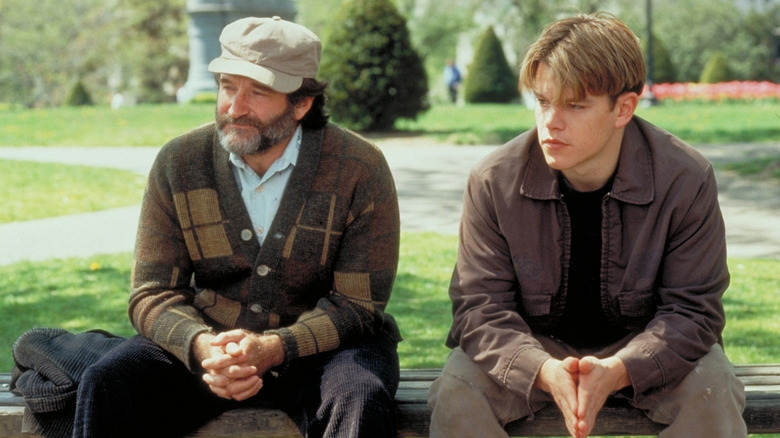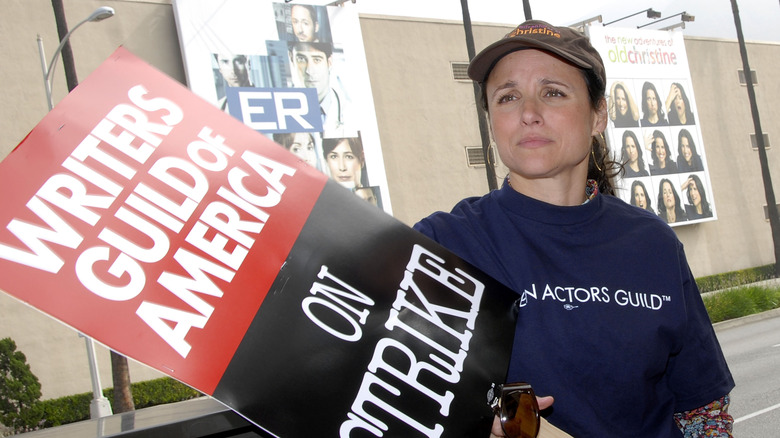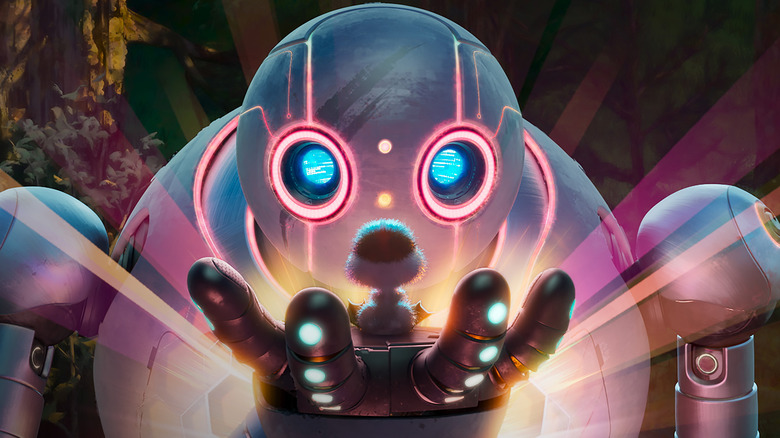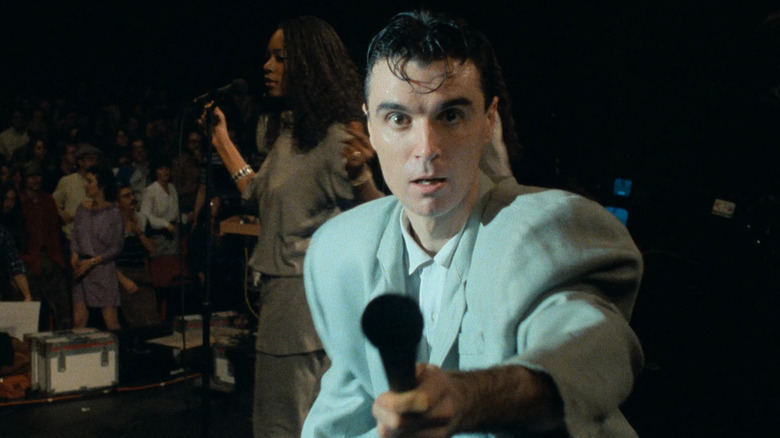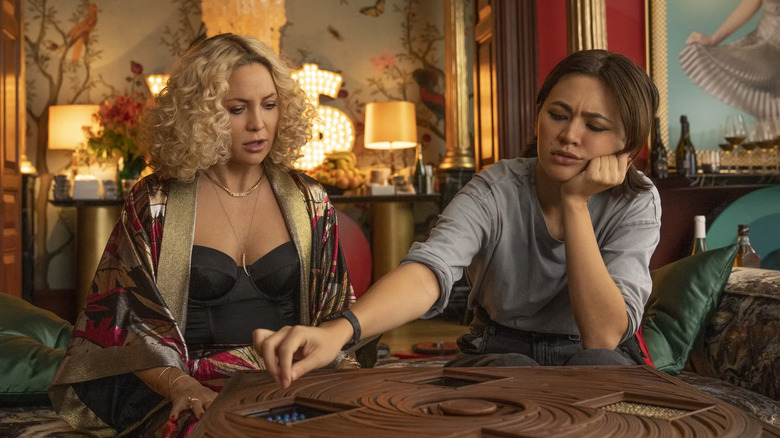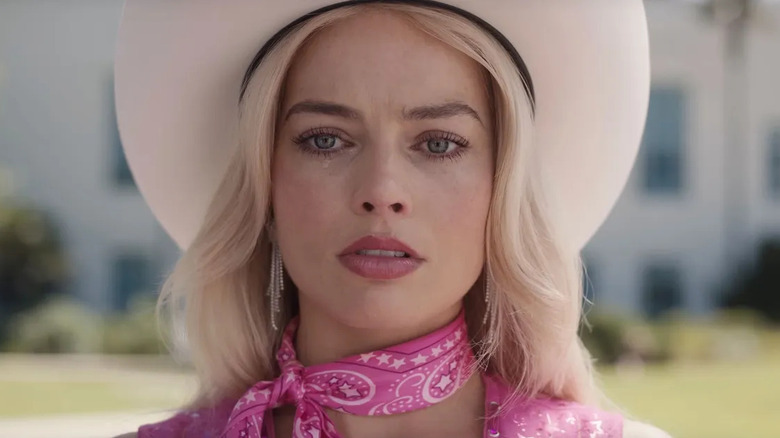How Long Do Movies Stay In Theaters? It's More Complicated Than You Think
How many times in the past few years have you seen a trailer for a new movie, thought it looked interesting enough to see on the big screen, only for it to be completely gone from theaters before you have a chance to go? If the answer is a number greater than zero, you're not alone. The movie theater industry has gone through a lot of changes in recent years, but none have become more prevalent than the limited theatrical runs of all films, including highly-anticipated recent releases like "Joker: Folie à Deux" and "Transformers One."
What's even more surprising is that not only are these films barely spending any time at all being shown in theaters, but they're also hitting streaming services or video-on-demand way quicker than they used to. For example, 2024's "The Fall Guy" premiered in cinemas nationwide on May 3, and was released digitally May 21, only two and a half weeks later. By the end of July 2024, it was available in physical media. This is even a huge shift from director David Leitch's "Hobbs & Shaw" in 2019, which hit theaters at the start of August of that year but didn't make it to video-on-demand until mid-October.
Of course, the movie theater industry is always subject to change, as evidenced by the closing of most drive-in movie theaters. There are many relevant factors at play forcing movies to leave theaters early, so let's take a look at some of the biggest and most concerning ones.
Streaming services are forcing theaters to rethink their appeal
By far the biggest adjustment the film industry has had to make in recent years is the rise of streaming services and their popularity not just as a home for movies after they leave theaters, but as distributors of original content themselves. This change has affected nearly every aspect of the industry, but none more so than movie theaters themselves. Even before COVID-19 hit in 2020, ticket sales were waning as filmmakers like Martin Scorsese made exclusive deals to put their newest films on streamers like Netflix.
Of course, streaming services aren't the first technological advancement that has been speculated to disrupt the movie theater industry. Over the medium's existence, their demise has been blamed on television, politics, and even the mere existence of superhero movies. However, none of these obstacles have posed competition for movie theaters like streaming has, offering audience members a much cheaper alternative than going to the theater.
As former head of research for U.T.A., David Herrin, told The New York Times, theaters weren't just struggling from the effects of the pandemic, but from a generational shift attributed to the rise of streaming services and other forms of entertainment. "Before, maybe you went every now and again — overlooking the drawbacks," he said, adding, "Now you add safety concerns to that mix, and you suddenly become a former filmgoer." With this massive change to the way people consume media, it's no wonder new films rarely hang around in theaters.
Because of COVID-19, films now go to streaming quicker
Obviously, COVID-19 changed all aspects of everyday life, but movie theaters were hit particularly hard by the shutdown. While some studios opted to delay their films indefinitely, other films didn't even get the theatrical releases they deserved. Disney's live-action remake of "Mulan" was available to Disney+ subscribers for an added fee, while festival darlings like "Palm Springs" and "The King of Staten Island" became streaming exclusives.
Of all the ways COVID-19 changed the film industry forever, one of the most impactful towards theaters has been theatrical releases moving to streaming and video-on-demand much sooner than they used to. In 2012, theatrical runs typically lasted for around 100 days before a home media release, though by 2017 theatrical runs had dropped below 100. In a post-COVID world, however, the power is in the hands of studios. Paramount Pictures now have their films debut on Paramount+ within a 45-day window, while Universal struck a deal with AMC to only keep their films exclusive to theaters for less than three weeks.
These changes have even caused problems for studios themselves, believe it or not. Because of their decision to release "Black Widow" in theaters simultaneously with its release on Disney+, lead actor Scarlett Johansson sued the company for breach of contract, claiming the dual release sabotaged its box office potential when Johansson was promised an exclusive theatrical release for the film.
Controversial movies have always been pulled from theaters early
The problems with certain films having shortened theatrical runs aren't just limited to the effects of COVID-19 or the overabundance of streaming services. There have been plenty of situations throughout film history in which films were pulled from cinemas prematurely, either due to controversy or just simply for bombing that hard. A notable example of the former was "Monty Python's Life of Brian," which faced significant protest from religious groups and was even banned in certain countries, but still managed to gross $20 million against a budget of $4 million.
"Life of Brian" happens to also be in good company. Stanley Kubrick's iconic masterpiece "A Clockwork Orange," originally released in 1971, was pulled from its British release by the director himself following a series of violent acts associated with the film across the U.K. A similar fate befell the 2014 comedy "The Interview," starring Seth Rogen and James Franco, whose theatrical release was cancelled entirely after Sony Pictures was hacked by the North Korea-affiliated Guardians of Peace.
On the other hand, there are lots of movies that were so bad, they were pulled from theaters. For example, there's the infamous romantic-comedy "Gigli," a 2003 film that first connected Ben Affleck and Jennifer Lopez as a romantic item off-screen, which only lasted a few weeks in theaters following incredibly scathing reviews. There was clearly no controversy surrounding audiences not getting to see that film.
Blockbusters drew big crowds back to theaters in 2023
While movie theaters have been especially struggling post-pandemic, 2023 was a sign that things could go back to the way they were. That's all thanks to the cinematic showdown that was "Barbenheimer," based on the simultaneous release of Greta Gerwig's "Barbie" and Christopher Nolan's "Oppenheimer." The buzz for both films boosted ticket sales for both of them, even as "Mission: Impossible — Dead Reckoning Part One" and "Elemental" fell below expectations.
What's more significant about both films, thanks to their theatrical performances, is that they remained in theaters far longer than other films in 2023. "Barbie" saw its VOD release around 45 days after its premiere, but returned to theaters in September 2023 for a one-week-only run in IMAX. "Oppenheimer," on the other hand, took over 70mm screenings through the end of August 2023, and also made an IMAX-exclusive one-week return in November.
Thankfully, "Oppenheimer" had the backing of Nolan, who has been vocal about protecting films from streaming services. While "Barbie" hit Max in December 2023, "Oppenheimer" didn't even have a home video release until November, and wasn't available on any streaming service until February 2024. "Oppenheimer" even had an unusually long theatrical run at 90 days, with Universal Pictures chief Donna Langley telling The Information, "I'm going to put Chris Nolan in a category of one, or one of three." She added, "Without getting specific, I think [release windows are] going to be shorter ... It just makes practical sense."
The decline of DVDs has also affected studio expectations on theaters
Even though home video releases of movies still exist, that side of the movie business is simply not what it was a few decades ago. During an appearance on "Hot Ones," Matt Damon explained how the absence of the DVD as a major component of a film's release has caused significant change on the studio side of things, saying, "You could afford to not make all of your money when it played in the theater, because you knew you had the DVD coming behind the release, and 6 months later ... it would be like reopening the movie, almost."
With DVDs becoming practically obsolete thanks to streaming, theaters have higher expectations to live up to, according to studios. If a film from Universal fails to gross over $50 million at the box office, the studio has the option to pull it by the end of its third weekend at several massive theater chains. Unfortunately, this has led some studios to make decisions for films based on arbitrary data, such as Warner Bros.'s controversial move of canceling "Batgirl" and "Coyote vs. Acme" because they deemed them more valuable as tax write-offs than potential blockbusters. These studio decisions have clear consequences on the box office overall, with films like "Furiosa: A Mad Max Story" and "Indiana Jones and the Dial of Destiny" proving that the industry has entered an unhealthy feedback loop of trying to guarantee financial success, ultimately hurting theaters.
The Hollywood strikes in 2023 raised questions about the value of streaming
As if COVID-19 wasn't enough of a blow to the film industry, Hollywood was hit by two strikes in 2023 between the WGA and SAG-AFTRA. As the first time since 1960 both unions struck at the same time, this put many productions on hold for over six months, resulting in studios delaying the release of movies like "Dune: Part Two" and "Challengers." However, there's a lot more to both the 2023 SAG-AFTRA strike and the 2023 Writers Guild strike that spoke to the current struggles of theaters.
Not only was the theatrical box office ultimately hurt by delays, as well as actors' inability to promote their projects, but the battle between theatrical releases and streaming services was a huge point of contention for both unions. In the past, theatrical or DVD releases would guarantee writers and actors residual payment for the films being re-released or aired on television. The challenges of television residuals have been a problem since the last writers' strike in 2008, and streaming only further complicated this issue.
In terms of how it affects theaters, studios have all the incentive to not let theatrical releases drag on too long, as it would result in more money being doled out to writers and actors. However, given the Wild West that is streaming services, writers and actors were being left in the dust while studios made big money loaning out the streaming rights to a film or television show.
Younger generations are harder to captivate with movies
The issues surrounding theaters aren't all industry-related. Some struggles are simply down to the attention span of Gen Z and Gen Alpha kids. With the increase of technology's omnipresence and kid-centric media apps like TikTok and YouTube, getting your toddler to sit still and pay attention to a film for over an hour in a dark room is a lot more challenging than it used to be. As Daniel D'Addario noted in an article for Variety, "If we can't get kids to sit through a 90-minute movie — if they're so accustomed to personalizing every element of their entertainment experience — what other communal experiences are they missing out on?"
Of course, there have obviously been exceptions to this in the past year of theatrical releases. Pixar's "Inside Out 2" got an unconventional 100-day run at the theaters, grossing over $1 billion at the international box office before it even hit Disney+. This strategy had been similarly adopted for a previous release, "Elemental," which survived a slow start at the box office and eventually left theaters with $500 million at the box office. Even brand-new IP like Universal's "The Wild Robot" was considered an outlier in wider box office trends.
Perhaps there's still hope yet for younger generations to fall in love with the theatergoing experience, but for those who grew up in a post-pandemic world, there's less nostalgia associated with the magic of buying a bucket of popcorn to enjoy a communal viewing.
Theaters have begun prioritizing re-releases
Surprisingly, a big drawback to the movies isn't the latest studio-driven blockbuster or 3-hour-long Oscar bait. Moviegoers of all ages are frequently returning to the theaters to see classic films, whether in celebration of major anniversaries or to catch a cult classic with a packed audience. Lots of theaters across the world participate in "Ghibli Fest," a theatrical re-release of the best Studio Ghibli films, like "My Neighbor Totoro" and "Spirited Away," which stretches from late April to early December every year.
The trend of successful theatrical re-releases isn't an anomaly with Studio Ghibli, either. A24's distribution of the Talking Heads concert film "Stop Making Sense" grossed over $5 million in 2023, which even topped the film's initial theatrical run in 1984. As Jeremy Boviard, general manager of the Moviehouse in New York, told The Columbian, "There's about 20-30 percent less films being majorly distributed now than there were just five years ago ... There's definitely more holes in certain programming weekends."
Smaller, independent theater chains are also frequent homes for cult classic midnight screenings, whether it's "The Rocky Horror Picture Show" or "The Room," both of which see droves of viewers every year. Particularly during quieter months of the year with few huge draws to the movies, local re-releases have become reliable ways for theaters to continue surviving in a changing industry, especially when the director or stars appear for a live Q&A.
Streaming companies aren't even bothering with theatrical releases
Sadly, there's an even bigger issue than movies leaving theaters early to hit streaming. A lot of times, films never even get the chance to hit the big screen, which has become much more common in the post-pandemic film industry. Netflix is especially guilty of letting great movies skip theaters, as seen in 2022 when the follow-up to Rian Johnson's crowd-pleasing 2019 mystery "Knives Out," "Glass Onion," only saw a one-week exclusive run at the theaters in order to build up excitement for its eventual streaming drop a month later.
Netflix CEO Ted Sarandos bragged to Deadline about the strategy, saying, "We drove a ton of buzz with that theatrical release ... Our core business is making movies for our members to watch on Netflix, and that's what we're really focused [on]. Everything else is really a tactic to drive excitement around those films." However, this approach has garnered a lot of controversy, as many places in the country aren't lucky enough to get theatrical showings of Netflix exclusives like David Fincher's "The Killer" or even "May December."
Netflix isn't the only guilty party, either. The HBO-exclusive Zack Snyder cut of "Justice League" only ever screened in places like New York or Los Angeles for charity. 2024 also saw the theatrical releases of several Pixar films that were previously relegated to being Disney+ exclusives, including "Soul," "Turning Red," and "Luca," all of which deserved better treatment than the box office disappointment that was "Lightyear."
There may be hope for indie films, thanks to Taylor Swift
While 2023 raised a lot of questions about the survivability of movie theaters, one hero swept in to break new ground: Taylor Swift. On the heels of ending the first leg of her career-spanning Eras Tour, Swift brokered a deal directly with AMC to premiere her concert film, opting for the unconventional path of eschewing a distributor. As Swift told TIME Magazine, "Ultimately I did what I tend to do more and more often these days, which is bet on myself." That gamble certainly paid off, as "Taylor Swift: The Eras Tour" grossed over $250 million at the box office during its limited run.
Swift's film proved that movie theaters don't need big studios, potentially opening companies like AMC up to a future as distributors themselves. Even filmmakers like Christopher Nolan commended Swift for the effort as an ultimately positive thing for the future of theaters. The film was also limited to Thursday-through-Sunday showings in order to guarantee packed theaters, and it didn't even hit Disney+ until March 2024.
It's easy to say this was possible due to Swift's ability to self-produce, as evidenced by Beyoncé following suit with "Renaissance: A Film by Beyonce" chronicling her own 2023 tour, which grossed $44 million at the box office with no video-on-demand release. Only time will tell, but AMC hiring a new VP for distribution in 2024 signals they might have a game plan to counter studios' lack of support.
Once and for all: how long do movies stay in theaters?
It may be disheartening for fans of cinema to see great films get barely any time to prove themselves at the box office before they're thrown out of theaters and left to die on streaming services like Netflix or Hulu. Simply put, there's just nothing like the experience of going to the theater and experiencing a film without the temptation to look at your phone, pause, or become distracted. However, what audiences are noticing is a period of extreme change across all aspects of the entertainment industry, with movie theaters as collateral damage.
There's a lot of factors in play that determine a film's longevity in theaters: Box office success, public demand, studio interference, competition, and even the number of screens in a given theater. As New York City's Angelika Film Center said on its blog, "The average theatrical window has traditionally ranged from several weeks to several months ... This exclusivity period is strategically managed to maximize box office revenue and incentivize audiences to experience films on the big screen."
The best advice is, if you love movies, don't wait for video-on-demand or streaming releases to see them. Make an active effort to visit your local theater regularly to catch the latest releases, or look around you for an independent theater screening indie films or cult classics. As with any aspect of the film industry, the power isn't in the hands of studio executives or streaming giants; it's in the hands of the audience themselves.
